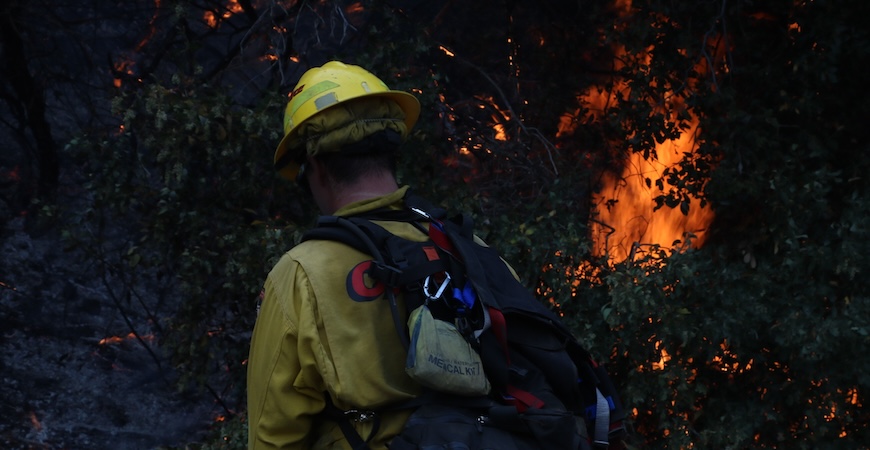
In 2020, the COVID-19 pandemic impacted many facets of life, including health care, schools and the work environment.
A new study by UC Merced researchers shows evidence that the pandemic also fueled an elevated number of wildfires in the United States that year.
How?
With schools and businesses shutting down and people trying to maintain safe social distances outside their pandemic pods, many headed out to nature for respite. That contributed to a 36% increase in the number of recreation-caused fires, like campfires, in 2020.
The study led by Adam Jorge, a Ph.D. student in the Management of Complex Systems program, showed that 2020 had one of the highest numbers of human-caused ignitions in the past three decades.
Those fires consumed a record-breaking amount of land in the Western United States. According to CalFire, nearly 10,000 fires burned over 4.2 million acres, more than 4% of the state's roughly 100 million acres of land, making 2020 the largest wildfire season recorded in California's modern history.
The UC Merced research team, in partnership with Oregon State University, Boise State University and USDA Forest Service scientists, reviewed nearly 30 years of fire ignition records, weather data, public land visitation data and data from Google's Community Mobility Reports to assess the influence of social disruptions indirectly tied to COVID-19 on wildfire ignitions. The study spans 11 Western states and specifically explores the distinct patterns in the increased number of debris burning, recreational use and fireworks-caused ignitions observed in 2020.
The article - "COVID-19 Fueled an Elevated Number of Human-Caused Ignitions in the Western United States During the 2020 Wildfire Season" - was recently published in Earth's Future. Among its key findings:
- Human-Caused Ignitions Surged: The number of human-started wildfires in 2020 was nearly 20% higher than the 1992-2019 average. Specific fire ignition causes such campfires, fireworks, debris burning and powerlines were also among the highest on record.
- COVID-19 Behavioral Shifts: Increased human presence in wildland areas - driven by social distancing measures and closures of indoor spaces - favored ignitions that further compounded fire management efforts.
- Weak Climate Correlation: Unlike burned area, which was linked to anomalous dryness, the spike in ignitions had a weak correlation with climate factors.
"Reactions to the COVID-19 pandemic altered mobility, recreation and fire management operations, and these changes led to increased and unsafe human interactions with fire-prone lands," Jorge said. "While we used COVID-19 as an experiment, changes in behavior resemble other social disruptions that impact fire management, such as government shutdowns, economic recessions and extreme weather conditions, which can limit resources for managing recreational lands and enforcing fire prevention measures."
Human sources ignite the majority of wildfires.
"Our results show how sensitive the environment is to behavioral changes," Jorge said. "Understanding the intersection of human behavior and fire ignitions is critical to mitigating future wildfire risks, especially as we face similar disruptions, such as sudden decreases in staffing or funding for parks and land management."
The increasing number of large wildfires in the Western United States poses severe risks to human health and the environment. Climate change and years of fire suppression have left the west susceptible to wildfire, and these risks are exacerbated by increased human presence in fire-prone landscapes.
The pandemic demonstrated how unexpected events can significantly alter human-environment interactions, and future fire management plans should incorporate contingency strategies for such disruptions, the researchers argue. Strengthening collaboration between public land agencies, local governments and fire departments can ensure more effective fire prevention and response efforts. The authors believe this study underscores the need for enhanced public awareness, enforcement of fire safety regulations and strategic resource allocation to mitigate human-caused ignitions in an increasingly fire-prone world.
The research team included UC Merced co-authors, Professor Crystal Kolden, director of the UC Merced Fire Resilience Center, professors John Abatzoglou and Jeff Jenkins, and postdoctoral research scientist Emily L. Williams. The work was supported through grants from the Department of the Interior's Joint Fire Science Program and the National Science Foundation.




 Public Information Officer
Public Information Officer

